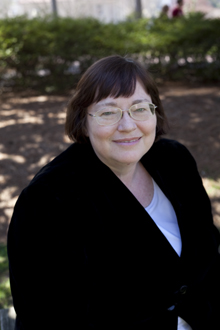People
March 29, 2010
Profile: Quest gave chaplain her spiritual identity

Victoria Armour-Hileman
Two years shy of graduating with her doctorate in British and American literature, Victoria Armour-Hileman, now Emory’s associate dean of religious life and chaplain, knew that she was still missing “an education.”
Meditating above the Celtic Sea during a year-long study abroad program in Wales, she felt entranced by “the voices, the prayers and the heartaches of the world.” Armour-Hileman immediately informed her parents and friends that she would continue to explore and learn abroad after graduation, her spiritual quest incomplete.
“I needed to go so far to make even the most foreign place feel like home,” she remembers. “Whatever was inside of me needed to settle down.”
Upon graduation, Armour-Hileman began volunteering with Maryknoll, a U.S.-based Catholic mission movement. Assigned to Vietnamese refugees in Hong Kong, she assembled a cooperative of female artists in the camps, helping them practice, teach and make money from their crafts. Later, she worked with indigenous Mon refugees in Thailand, the basis of her first memoir, “Singing to the Dead.” As a foreigner, Armour-Hileman flew under the radar of an oppressive regime, locating doctors who were willing to risk their livelihoods to treat the refugee population. The minimum tour of duty with Maryknoll was for three-and-a-half years; Armour-Hileman stayed for six.
During that time, she witnessed the refugees’ profound sense of group identity and loyalty, which made even refugee life bearable. Armour-Hileman envied that feeling of kinship, having been raised secularly by a Jewish mother and a Catholic father.
“I grew up believing that I belonged to the Jewish people,” she says, “but I didn’t know what that meant to me.”
After returning to the U.S., Armour-Hileman served on the leadership team for a branch of Maryknoll, sending volunteers to 14 countries. Nearly a decade later, she enrolled in Hebrew Union College’s Jewish Institute of Religion, where, as an enthusiastic composer, she created an unconventional musical for an end of the year sermon project and was recognized for her excellence in liturgy. All branches of Judaism, except the Orthodox, ordain women as rabbis and cantors.
Armour-Hileman joined Emory in 2008, promoting inter-religious dialogue and individual expressions of spirituality. The Religious Life Office provides institutional support to 30 recognized religious groups on campus, partnering with them and University departments on a variety of projects, including the implementation of a kosher meal plan at the DUC last fall. The office co-sponsors programs that integrate faith with learning, such as a recent workshop in the Women’s Center on creating a sense of Sabbath through meditation, and an intensive journaling project in collaboration with Volunteer Emory.
“We’re trying to integrate the whole college experience with the deepest questions of the heart,” Armour-Hileman says.
The Office of Religious Life also coordinates regular Chapel Teas, where faculty members discuss questions of ethics and spirituality surrounding their scholarship. Students, faculty and staff participate in Contemplative Practices workshops, which explore contemplative techniques across different cultures, such as chanting to drums and walking the labyrinth. Journeys of Reconciliation trips, held several times a year, offer participants two-week immersive experiences in cities at home and abroad to study such topics as oppression, conflict and culture.
In her spare time, Armour-Hileman is busy writing her second memoir, “Public Secret.” The book deals with a hidden truth she discovered about her father that ultimately led her to become a rabbi.
Back in academia, among colleagues devoted to exploring the life of the mind, Armour-Hileman is planning a spring event for the community to share spiritual themes in personal art work.
“We’re all spiritual beings,” she says. “Some of us have a clear religious identity. Some of us don’t. At a university that is ethically engaged, this is the place to ask those questions about what it means to be human.”
Quick Links
File Options
Related Information
Explore spiritual themes at art event
Rabbi Victoria Armour-Hileman will host “Spirit Sounds,” a religion and arts event on April 22 at 7 p.m. in Cannon Chapel’s Brooks Commons.“This is a chance for members of the university community to explore religious or spiritual themes through an original work in an arts medium, from visual arts to music or language arts,” she says.
Auditions — open to students, staff and faculty — can be arranged by e-mailing Ariel Wolpe.
